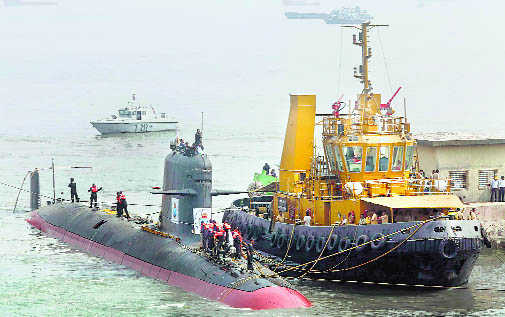
INS Kalvari, the Indian Navy's Scorpene submarine at the Mazagon Docks, Mumbai. It will be commissioned by September, ‘16. Five more submarines are on the way. Reuters.
Abhijit Bhattacharyya
Even at the grim possibility of being criticised, one dare suggest that never before in the history of South Asia, has India had such a powerful and indigenous navy as it has today. The credit for this does go entirely to a few naval-minded administrators and fewer sea-power enthusiasts and protagonists (both military and civil) of independent India. They realised the failure and folly of past negligence and the future centrality of seapower of the state. Understandably, the conspicuous lack of a robust and proactive naval tradition of India took long to change. The reason for this was the history of continuous defensive land wars being fought by the Indians since time memorial to fend off aggressive hordes of foreign invaders through land.
It may be recalled that virtually the whole of Ramayana, except till the arrival of Hanuman on the scene, is the story of land warfare. Water force has never been the forte of the Indians, notwithstanding the existence of innumerable waterbodies and hundreds of rivers. The epic war of Mahabharata too had no semblance of any sea force. The story virtually revolves round the heartland surrounding modern Delhi. In a way, the mother of all battles could be considered to be the precursor and predecessor of the battles of Panipat-syndrome of Indian history. It signified the importance of land warfare of South Asian heritage in the psyche of the indigenous ruling class of India.
One would like to believe the name Panipat, translated into English, could mean Pani (water) and Pat (Path?) thereby denoting the existence of “the way/path the water flows” or “the path/way lying near water”? Is not it natural that one would, post-bloodshed, like to have perennial source of water bodies in the vicinity to clean, clear and wash the blood and dead bodies by water? Even when the "victorious Pandavas" are retreating (retiring?) post-war reign, they traverse the high hills of Himalayas (the eternal source of water of South Asia), but do not explore the ocean or go anywhere near waterbodies. The magnetic attraction of land perhaps is a key to eternal human psyche evolved over centuries. As the history of the world usually is the history of war, to capture land and enjoy the fruits thereof, it is a natural propensity of humans to capture, hold and settle therein. Nevertheless the one exceptional feature of the last 500 years of world history is that the capture or conquest of land traditionally (since the 15th century) has been the prerogative of the western nations. This despite unprecedented achievements and conquests of some great land warriors from, the heartland of Euro-Asian plains.
Except Japan, from the late 19th century, and Turkey to a limited extent, command, control and campaign missions in the oceans usually fell under the sole domain of the UK, Spain, Portugal, France, Netherlands, Germany and Italy and at a later stage, post-World War 1, that of the USA. Even the Russians were nowhere near their west European competitors, except from the beginning of World War II.
The Mughals, despite having achieved the status of South Asia’s “super land power. At the height of its power, status and glory, they spanned modern-day Kabul in the north-west to the Cox's Bazaar in south-east, and Kashmir in north to river Kaveri in the south. They virtually had no navy to counter the advent of the Europeans, who landed in their vessels in the vast, open and unguarded coastline of India. Few rulers of India had an idea of the importance of a navy and fewer still had any semblance of ocean experience. Little wonder that the Indians failed whenever and wherever they faced the Europeans in the sea. Thus Vasco da Gama landed at Calicut without any hassle, as reportedly, he was extended more hospitality, than hostility, and “due” courtesy. And in reality, if there took place any naval skirmish on the Indian coastline, inevitably it (mostly) took place between rival and competing Europeans and rarely with Indians as various wars between European empires, more often than not, spilled over to the South Asian terrain and territorial waters.
On November 29 and 30, 1612, the nascent British East India Company fleet defeated the Portuguese fleet near Surat. On May 2, 1654, came the next naval fight when the Dutch boats defeated the Portuguese flotilla off the coast of Colombo. The Portuguese, arguably one of the most ferocious and skilled of early European sea warriors, in April 1713, defeated disparate elements of Indian force off Cheul and again near Karwar in 1718. In reality, except the rare victory of Raja of Travancore over a Dutch naval force at Colachel on August 10, 1741, the Indians managed to continue with their conspicuous lack of naval tradition.
The Indian Navy is one of the top five sea-going forces of the world, with an impressive line of in-house production and commissioning of boats. India, however, needs to ensure that its enterprise does not get sabotaged by those to whom it may be the loss of a lucrative business deal. After all, defence is business, economics, employment as well as fat profit.
The author is a Supreme Court advocate and graduate of National Defence College, New Delhi.



























